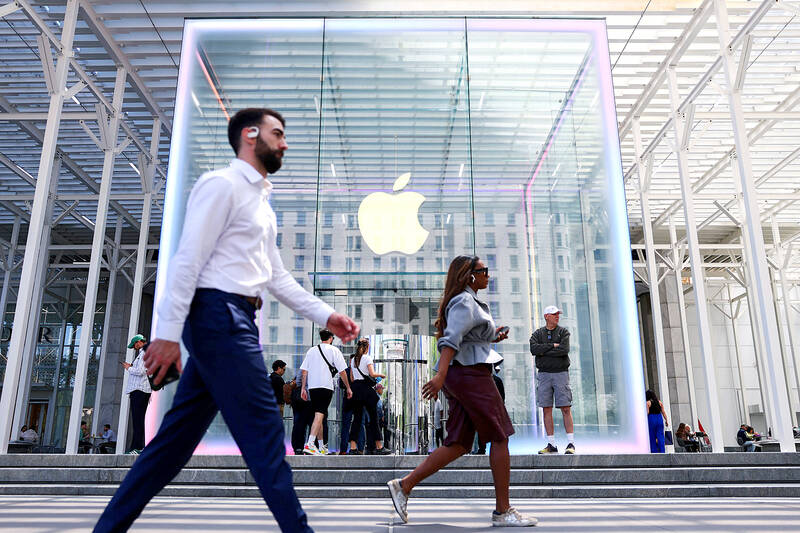Apple Inc on Thursday reported first-quarter profit above expectations, but warned that US tariffs could cost the company and were disrupting its supply chain.
Apple expects US tariffs to cost US$900 million in the current quarter, even though their impact was “limited” at the start of this year, Apple chief executive Tim Cook said on an earnings call.
“We are not able to precisely estimate the impact of tariffs, as we are uncertain of potential future actions prior to the end of the quarter,” Cook said. “Assuming the current global tariff rates, policies and applications do not change for the balance of the quarter and no new tariffs are added, we estimate the impact to add $900 million to our costs.”

Photo: Reuters
Apple plans to source more than 19 billion chips from the US this year, part of a global supply chain shift to gradually lessen its reliance on China and elevate India for iPhone production.
Cook said he expected “a majority of iPhones sold in the US will have India as their country of origin,” adding that Apple’s products were exempt from Trump’s most severe tariffs for now.
India was mentioned almost as many times as China on Thursday’s post-earnings conference call, reflecting its rising importance.
Apple has accelerated its manufacturing expansion in India, which is rising as a market — at a time when Apple’s China sales keep declining — and is likely to be a more politically favored US trade partner over the long run.
Apple already makes 20 percent, or one in five, of its iPhones in the South Asian country. It expects to import most of the iPhones for the US from India by the end of next year.
Tit-for-tat exchanges have seen hefty US levies imposed on China, with Beijing setting retaliatory barriers on US imports.
High-end tech goods such as smartphones, semiconductors and computers received a temporary reprieve from US tariffs.
“We have a complex supply chain, there’s always risk in the supply chain,” Cook told analysts on the call.
“What we learned some time ago was that having everything in one location had too much risk with it and so we have, over time, with certain parts of the supply chain, not the whole thing, but certain parts of it, opened up new sources of supply,” he said.
Beyond India, Trump wants Apple to begin building its devices in the US, but that is unlikely to happen at scale in the foreseeable future. For now, Cook pledged to ramp up local procurement of chips and other components.
The iPhone maker would obtain tens of millions of advanced processors from a new facility in Arizona operated by Taiwan Semiconductor Manufacturing Co (TSMC, 台積電) this year, Cook said.
The facility has started making processors for low-end iPads and Apple Watches, Bloomberg News reported.
Apple and TSMC have announced US investments amounting to hundreds of billions of dollars in line with the White House’s push to bring advanced manufacturing to the country.

Greek tourism student Katerina quit within a month of starting work at a five-star hotel in Halkidiki, one of the country’s top destinations, because she said conditions were so dire. Beyond the bad pay, the 22-year-old said that her working and living conditions were “miserable and unacceptable.” Millions holiday in Greece every year, but its vital tourism industry is finding it harder and harder to recruit Greeks to look after them. “I was asked to work in any department of the hotel where there was a need, from service to cleaning,” said Katerina, a tourism and marketing student, who would

i Gasoline and diesel prices at fuel stations are this week to rise NT$0.1 per liter, as tensions in the Middle East pushed crude oil prices higher last week, CPC Corp, Taiwan (台灣中油) and Formosa Petrochemical Corp (台塑石化) said yesterday. International crude oil prices last week rose for the third consecutive week due to an escalating conflict between Israel and Iran, as the market is concerned that the situation in the Middle East might affect crude oil supply, CPC and Formosa said in separate statements. Front-month Brent crude oil futures — the international oil benchmark — rose 3.75 percent to settle at US$77.01

Merida Industry Co (美利達) has seen signs of recovery in the US and European markets this year, as customers are gradually depleting their inventories, the bicycle maker told shareholders yesterday. Given robust growth in new orders at its Taiwanese factory, coupled with its subsidiaries’ improving performance, Merida said it remains confident about the bicycle market’s prospects and expects steady growth in its core business this year. CAUTION ON CHINA However, the company must handle the Chinese market with great caution, as sales of road bikes there have declined significantly, affecting its revenue and profitability, Merida said in a statement, adding that it would

UNCERTAINTIES: The world’s biggest chip packager and tester is closely monitoring the US’ tariff policy before making any capacity adjustments, a company official said ASE Technology Holding Inc (日月光投控), the world’s biggest chip packager and tester, yesterday said it is cautiously evaluating new advanced packaging capacity expansion in the US in response to customers’ requests amid uncertainties about the US’ tariff policy. Compared with its semiconductor peers, ASE has been relatively prudent about building new capacity in the US. However, the company is adjusting its global manufacturing footprint expansion after US President Donald Trump announced “reciprocal” tariffs in April, and new import duties targeting semiconductors and other items that are vital to national security. ASE subsidiary Siliconware Precision Industries Co (SPIL, 矽品精密) is participating in Nvidia